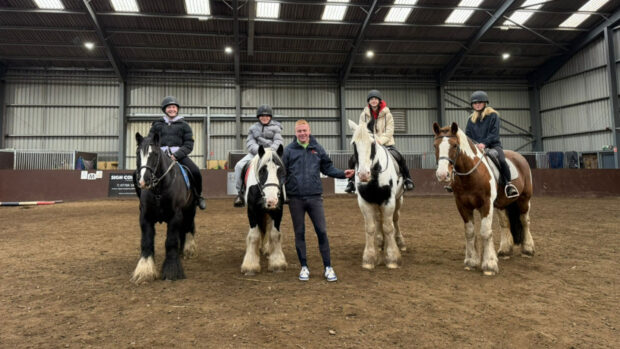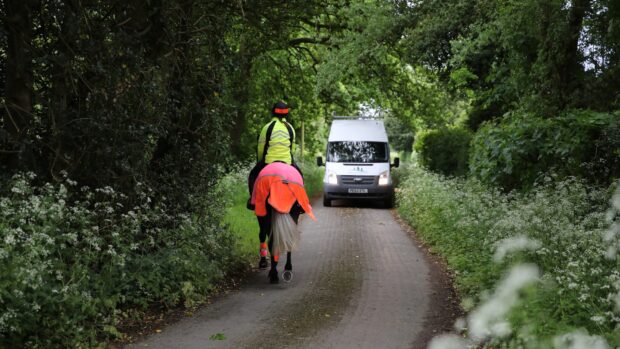A former event rider who set up a charity that works with rescue horses to support military veterans, blue light workers and young people with mental health challenges has been honoured with an award from the Prime Minister.
Carrie Byrom, who established Stable Lives after her riding career was derailed by a catastrophic fall in which she broke both her arms, was named a Point of Light by Boris Johnson on 12 November.
The daily awards, launched in 2004, recognise “outstanding volunteers” and those who make an impact on their communities.
Stable Lives, run from Parbold Equestrian Centre near Wigan, Lancs, has remained open during the Covid-19 pandemic, providing respite to frontline medical staff alongside their usual sessions.
“At the end of a very long day I had an email letting me know I’d received the award and I was absolutely shocked,” Carrie told H&H. “I have no idea who nominated me but I was really touched someone had taken the time and recognised what we do.
“For me it’s very much a team award as I’ve seen how hard our volunteers work. I have been so proud that we have been able to reach out and support so many key workers, children and military veterans through these challenging times. It is always our privilege to witness how our horses can bring peace and calm when people are facing mental health challenges.”
Stable Lives grew out of the riding school that has been run from Parbold for more than 20 years and uses 80% rescue horses and ponies. Carrie, an international rider who had qualified for Badminton at the time of her fall, also had extensive experience of competition horses with complex characters.
“It developed as we started to teach people how we rehabilitate the rescue horses, incorporating things like the importance of nutrition and rest and of being able to read body language. We are not counsellors or psychotherapists, what we do is we teach people about the rescue horses and they implement what they learn in their own lives,” she said.
The centre has extended its sessions to offer respite days to doctors, nurses and other blue light personnel in recent months as well as making sure the other people they were helping had continuity of support.
“We realised early on the situation key workers were in and where our military work was concerned, we knew their support had gone to nothing. As we are an outdoor venue we were able to set up respite courses and keep going within Government guidelines.” Carrie said.
“The stories we’ve heard on the respite days brought home that people needed the help. Doctors and nurses have just been going from work to home on repeat without any chance to unwind. They’ve been able to come to us and relax in a safe and calm environment.
“We touch on the importance of correct nutrition and rest and reiterate the basics of mental health and we have a cup of coffee and a laugh and then we’ll usually have an activity people won’t have tried before, like basket weaving, just so they have a break.”
Stable Lives has seen more than 100 people through the spring and summer, including children who have eating disorders or have suffered bereavements and “needed the help now, not in six months’ time”.
The charity was also instrumental in developing the framework for Changing Lives Through Horses, a British Horse Society scheme that offers an alternative learning environment for those struggling in mainstream education.
Carrie has furthered this work with the release of a mental health book for children The Horse With No Name, inspired by a potential dressage horse who came from a difficult background.
“I tried to break him the normal way but it became apparent there was only one person he was going to let deal with him, if I had anybody help me then he would start rearing and bolting, he was terribly frightened.” Carrie said. “In the end, I had to back a 17hh three-year-old by myself and now he’s progressed from a complete renegade into a very smart dressage horse.
“What the book does is give you a platform to talk to children about behaviour. It is the story of how he overcame anger and fear and it’s being used by counsellors in schools to talk about how we process fear.”
Article continued below…

‘It’s okay not to be okay’: Cold Feet star teams up with equine film company in new project
The Fall tackles the subject that athletes can suffer in silence from mental health issues, often feeling the need to

Vets’ mental health a major concern

Subscribe to Horse & Hound magazine today – and enjoy unlimited website access all year round
The book also tackles the subject of resilience — something Carrie understands well having had everything she had worked for decimated by the injuries sustained in her fall.
“I retired from eventing as I had less strength through my arms — although I did go back and compete at the level I fell at, I was having to ride differently,” said Carrie, who is now working her way up through the levels in dressage. “I’d qualified for Badminton, I had a potential team horse and I thought that’s what life was going to be about but I went from that to absolutely nothing.
“The theme of the book is that bad stuff does happen but it doesn’t have to limit your future. A lot of the children we work with come from bad backgrounds and don’t have much hope but we show them horses who have also come from bad backgrounds and do have hope.”
Horse & Hound magazine, out every Thursday, is packed with all the latest news and reports, as well as interviews, specials, nostalgia, vet and training advice. Find how you can enjoy the magazine delivered to your door every week, plus options to upgrade to access our H&H Plus online service which brings you breaking news as it happens as well as other benefits.




